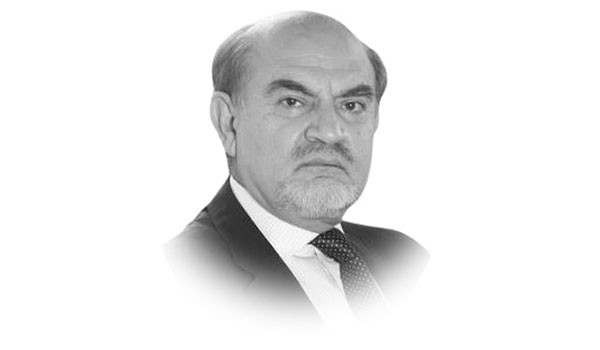Democracy — thy name is confrontation
DEPRIVED of victory, many Pakistani politicians cry foul and resort to litigations, agitations and demonstrations.
In 2013, the outcome of the elections was not accepted by the losers, allegedly on account of rigging and corruption by the rulers.
This led to a marathon sit-in for protests at Islamabad that saw much violence before ending after 126 days.
Again, after the 2018 elections, the losers rejected the results, on the same grounds, besides blaming state institutions for being biased in the process.
In April this year, the Opposition united and subverted the loyalties of some ruling party lawmakers, to change the government through a No-Confidence Vote, but the move was rejected by the outgoing regime, citing horse trading and ‘conspiracies’ against it.
But such incidents aren’t restricted to Pakistan, as these were also witnessed in the world’s oldest democracy in 2020, when Donald Trump’s supporters assaulted the U.S.
Capitol to overturn his election defeat. Consequently, 140 policemen were injured while defending the Capitol and 730 people were charged with crimes.
Back in Pakistan, while hearing a reference seeking interpretation of Article 63-A, the CJP questioned why the SC should deal with political matters when its decisions are criticized (Dawn, Apr 18).
This is indeed an apt remark, as politicians are usually unhappy with those pronouncements that don’t favour them, and frequently resort to undue criticism of courts and other state institutions due to such outcomes.
But while the courts are cautiously derided for fear of the consequences of the ‘contempt’ legislation, others are chided, given pejorative names, falsely blamed for being prejudiced and even censored for being apolitical, in accordance with the oath of their office.
Additionally, party supporters, WhatsApp and media warriors are launched for the most vicious assaults on all opponents, real or perceived, with no holds barred, to defame and discredit them and to divert attention from their own political failures and ill- governance.
Thus, on 25th May, while hearing the case of violent protests at Islamabad, the CJP observed: ‘Whatever happened yesterday has shaken the SC’s trust in political parties’ (The News, 26 May).
The acute political polarization we face today isn’t restricted to beliefs that the other side is wrong; partisans now see all rivals as malevolent and immoral forces.
The most worrying aspects are blame-shifting tactics for political losses rather than taking responsibility, introspection and self-audits.
This leads to a vicious cycle, whereby the language used to galvanize one side, directly demonizes the other.
Further, partisanship and patriotism are equated, as each side claims that the other will destroy the nation if they achieve power.
This is how democracies fall apart and it has happened many times in Pakistan previously, when political problems couldn’t be remedied and the people started looking towards the judiciary and the defence forces to intervene and rescue the situation.
So how can democracy be saved, sometimes from its own custodians? First; the working of democracy, explained by Iqbal as ‘a form of government wherein people are counted not weighed’, must be understood and accepted by everyone.
Second; unless there is a change in the radical and poisonous socio-political culture, within the political parties, democracy shall continue to diminish.
This transformation can be brought only by the voters if they stand vocally against polarizing and hateful language and actions and by declaring such behaviour unacceptable by them to their affiliated groups.
This can transform social media into a kinder entity too and while it may be unable to alter deep seated beliefs, it could control damage to society and democracy.
Removal of fake or hateful messages, reducing the spread of vile memes and curbing prejudiced or polarizing speech will also be needed.
Disinformation mustn’t be reiterated even to debunk it, as it reinforces false perceptions, regardless of its accuracy and since our minds readily accept feedback which we like.
Further, to prevent the spread of disinformation, merely provision of facts can correct distorted views, reduce schisms and extreme prejudice.
Third; Pakistanis may be more divided emotionally than ideologically, as we debate much less on crucial and tough decisions on economic policies, job creation, education, health matters, cost of living and social or physical security.
Holding politicians more accountable on these objectives and less on their favourite, intangible slogans and clichés like ‘liberty’ or reincarnation of ‘old’ or ‘new’ Pakistan.
Fourth; emphasizing and accepting disagreement on policies within political parties to reduce polarity and reminding party members of a range of viable, alternate options for achieving the same objectives.
Fifth; decades of deceptive discourse about legislators switching loyalties in return for financial benefits or other personal incentives, shows how politics has been hollowed from within.
We must collectively condemn, eliminate and delegitimize this trend or else democracy could morph into a façade or crumble altogether.
Sixth; measures contained in the Pakistan Electronic Crimes Act (PECA) Amendment Ordinance and Amendment to Section 500 of the Pakistan Penal Code, making defamation offences cognizable against institutions (in addition to individuals) must be urgently revived.
This will ensure that rights of freedom of expression are used, subject to law, public morality and societal ethos like honesty, truthfulness and moderation.
Seventh; if political differences can’t be fixed by the politicians themselves, the people, academia, media and civil society must intervene and prod the leaders to reject political extremism in all its manifestations.
We must demand display of civility, tolerance and empathy as part of democracy and strive for transforming our political paradigm into an honest, accommodative, amiable and peaceful phenomenon.
Finally; only through EVM voting, not for party affiliations, ethnic grouping, clan identities, feudal and media influences or other cleavages, but for better policies, candidates with good reputation and governing competence, could democracy develop and be moderated.
Sans such a revolution, the goals of politico-economic stability will remain elusive and Churchill’s warning that “The best argument against democracy will be a five-minute conversation with the average voter,” will keep getting validated.
—The writer is the former President of NDU.










